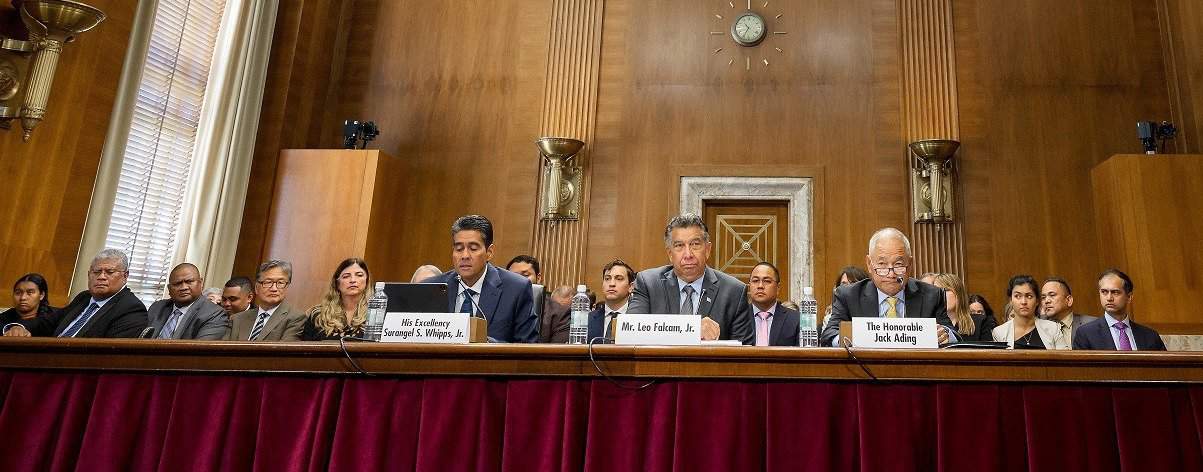It is no secret that Israel is disproportionately singled out at the United Nations. Last year, the General Assembly approved 15 anti-Israel resolutions. That was two more than all of the other resolutions criticising other countries, according to UN Watch. The United States, Israel’s longstanding ally, consistently opposes these measures, with very few exceptions. Joining the U.S. is usually a handful of Pacific island nations.
Despite their well-documented wanderlust, most Israelis have trouble finding these countries on a map. Federated States of Micronesia, Marshall Islands, Nauru, and Palau are among them. They are predominantly Christian countries, which may account for their political leanings. But it is their close ties with Washington that are the deciding factor.
On my visit to Palau, one senior official bluntly told me, “We vote with Israel because that’s what America does.” It’s that simple.
There are now reasons to fear that Palau and its neighbours are under pressure from China to pivot away from the United States. Much of this revolves around their recognition of Taiwan, and Beijing’s desire to change that. But Palau, in particular, holds strategic value for America in the event of a Chinese invasion of Taiwan.
The island nation is a short three-and-a-half-hour flight from the Taiwanese capital of Taipei. Indeed, Palau could prove useful for stationing American air and sea assets, not to mention personnel.
America and Palau have a “Compact of Free Association.” Periodically, Washington negotiates a new agreement that provides funding which covers a large chunk of Palau’s budget. As part of that deal, the U.S. assumed responsibility for Palau’s security, and it reserves the right to deploy its military in the event of a crisis.
With great power competition heating up, Washington may look to extend and harden the runway of the international airport to accommodate military aircraft. More tangibly, work has also begun on new radar installations, which could help the U.S. detect and deter Chinese aircraft in the event of a Taiwanese invasion.
China is bolstering its influence in the Pacific
But China is not sitting back. Chinese are flooding the island, apparently seeking to buy political influence. Chinese charter flights now arrive regularly. Palauans say that these Chinese “tourists” are leasing Palauan property (sometimes near military sites), and gaining financial influence by injecting cash into their struggling economy. One official claimed that China has offered Palau US$100 million to rescind its recognition of Taiwan and fall in with Beijing.
However, it doesn’t end there. Beijing has already succeeded in installing Huawei telecommunications equipment across the island nation, potentially granting Beijing access to sensitive information about the local population. The Palau government said there were American plans to jettison the Chinese giant’s telecom equipment back in 2021. However, the State Department just recently announced plans to “modernise” the network. This looks like an admission that the previous plan was never put into action.
In May, a Chinese “research vessel” entered Palau’s exclusive economic zone and hovered over the fiber optic cable that keeps the country connected to the outside world. This was the fourth such incursion, in what can only be described as a gray-zone warfare campaign.
Palau lacks the ability to respond to such provocations. The country maintains a small maritime police force, with vessels donated from allied states. But none of them can match the firepower of the Chinese Navy.
In January, the country issued a rare public cry for help. Talks are ongoing with the U.S. about what, if anything, can be done. Interestingly, there may be room for Israel to help.
Israel has important resources it can bring to the table. From surveillance and financial intelligence, to cyber and maritime security, Israel can help Palau and its neighbors withstand China’s campaign. It can do so informally, and without setting off a diplomatic crisis with Beijing.
Israel obviously does not want to anger China, which accounts for billions of dollars of trade with the Jewish state. But if Israel wishes to keep its friends at the United Nations, it cannot look the other way. Should China pull Palau, or any of the other Indo-Pacific allies, out of the American orbit, it will be a severe diplomatic loss for Israel.
Some might say that it is not worth the trouble. However, Israel must remember Palau’s agreement with Washington is not ironclad. Palau is one of three “Freely Associated States” (along with the Federated States of Micronesia and the Marshall Islands). They all “freely” align with the U.S. And that means they freely vote with the United States at the UN.
If Israeli policymakers want that to continue, it may be time for Israel to look east to the Pacific..
The writer is senior vice president for research at Foundation for Defense of Democracies, a nonpartisan think tank in Washington.
The opinions expressed in this article are those of the authors and do not necessarily reflect the opinions of this publication.
